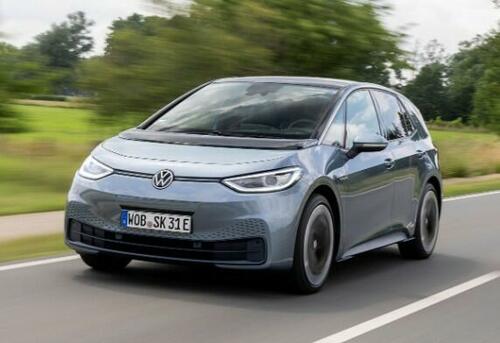
In the third quarter, Volkswagen AG saw a robust increase in sales in Europe and North America, which helped counterbalance a decline in the Chinese market.
The automaker saw its Chinese deliveries fall 5.8% during Q3, according to a Friday morning wrap-up by Bloomberg. But global deliveries rose by 7.4%, amounting to 2.34 million vehicles delivered for Volkswagen. Specifically, sales surged 9.9% worldwide in the month of September alone.
In China, the company faced a slump as third-quarter deliveries dipped to 837,200, and September sales experienced a slight decline of 0.9%.
Despite the decline in China, EV sales continue to be robust in the country. The delivery of all-electric vehicles in China surged by an impressive 90% to 21,662 vehicles in September, largely propelled by ID.3 sales, which outstripped overall market gains of 12%.
Meanwhile, Western Europe witnessed a significant 21% uptick in sales to 799,300 during the third quarter, and North American sales climbed 12% to 257,400.
We noted in late September that competition was so robust in China, some automakers like Mitsubishi were pulling out of the geography. Back in early summer, Volkswagen had slowed its production of EVs due to weakening sales.
"We are experiencing strong customer reluctance in the electric vehicle sector," Manfred Wulff, head of the works council for Volkswagen's Emden plant said in June. That appears to no longer be the case - at least in China.
We noted last week that the EV market in China is growing so quickly and prices are plunging at such a rapid rate, that the EU is investigating, claiming that emerging data indicates a probable surge in government-backed, low-cost imports, putting an already fragile EU sector at immediate risk.
The EU has launched an inquiry focused specifically on newly produced electric vehicles intended for carrying nine or fewer passengers; motorcycles, however, are not part of the current probe and the investigation is expected to wrap up within a year.
China's Ministry of Commerce objected to the investigation, claiming it "is solely based on assumption and lacks sufficient evidence," Bloomberg reported last week.
We noted weeks ago that Tesla's EVs would be included in the investigation. EU executive vice-president Valdis Dombrovskis said in late September that there was “sufficient prima facie evidence” to support the probe. We had previously written about the EU's investigation and Beijing's response via The Global Times.
As we noted last month, China responded to the investigation via The Global Times, claiming that the EU's probe would likely "backfire" and that the EU's economy would suffer as a result. The publication said that "...as the EU wields trade protectionist measures to suppress China's EV industry, the European economy may suffer."
The article claimed that the EU isn't bothered by the subsidies, but rather "the rapidly growing market influence of Chinese EV companies" and "the concern that homegrown European enterprises may be unable to compete."
"Clearly, Europe is afraid," The Global Times wrote. "They are afraid of competition from China, so they want to seek trade protectionism as a protective umbrella for European auto makers who are slowly transitioning toward electrification." China added that the EU should "have enough courage to face competition from their Chinese counterparts directly."
In the third quarter, Volkswagen AG saw a robust increase in sales in Europe and North America, which helped counterbalance a decline in the Chinese market.
The automaker saw its Chinese deliveries fall 5.8% during Q3, according to a Friday morning wrap-up by Bloomberg. But global deliveries rose by 7.4%, amounting to 2.34 million vehicles delivered for Volkswagen. Specifically, sales surged 9.9% worldwide in the month of September alone.
In China, the company faced a slump as third-quarter deliveries dipped to 837,200, and September sales experienced a slight decline of 0.9%.
Despite the decline in China, EV sales continue to be robust in the country. The delivery of all-electric vehicles in China surged by an impressive 90% to 21,662 vehicles in September, largely propelled by ID.3 sales, which outstripped overall market gains of 12%.
Meanwhile, Western Europe witnessed a significant 21% uptick in sales to 799,300 during the third quarter, and North American sales climbed 12% to 257,400.
We noted in late September that competition was so robust in China, some automakers like Mitsubishi were pulling out of the geography. Back in early summer, Volkswagen had slowed its production of EVs due to weakening sales.
“We are experiencing strong customer reluctance in the electric vehicle sector,” Manfred Wulff, head of the works council for Volkswagen’s Emden plant said in June. That appears to no longer be the case – at least in China.
We noted last week that the EV market in China is growing so quickly and prices are plunging at such a rapid rate, that the EU is investigating, claiming that emerging data indicates a probable surge in government-backed, low-cost imports, putting an already fragile EU sector at immediate risk.
The EU has launched an inquiry focused specifically on newly produced electric vehicles intended for carrying nine or fewer passengers; motorcycles, however, are not part of the current probe and the investigation is expected to wrap up within a year.
China’s Ministry of Commerce objected to the investigation, claiming it “is solely based on assumption and lacks sufficient evidence,” Bloomberg reported last week.
We noted weeks ago that Tesla’s EVs would be included in the investigation. EU executive vice-president Valdis Dombrovskis said in late September that there was “sufficient prima facie evidence” to support the probe. We had previously written about the EU’s investigation and Beijing’s response via The Global Times.
As we noted last month, China responded to the investigation via The Global Times, claiming that the EU’s probe would likely “backfire” and that the EU’s economy would suffer as a result. The publication said that “…as the EU wields trade protectionist measures to suppress China’s EV industry, the European economy may suffer.”
The article claimed that the EU isn’t bothered by the subsidies, but rather “the rapidly growing market influence of Chinese EV companies” and “the concern that homegrown European enterprises may be unable to compete.”
“Clearly, Europe is afraid,” The Global Times wrote. “They are afraid of competition from China, so they want to seek trade protectionism as a protective umbrella for European auto makers who are slowly transitioning toward electrification.” China added that the EU should “have enough courage to face competition from their Chinese counterparts directly.”
Loading…





